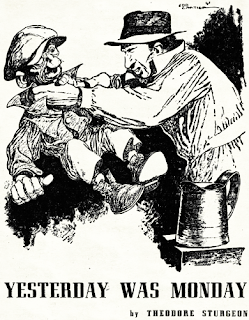 |
| in the Ekcolir Reality original cover by Gerard Quinn |
"The Immortal Bard" is very short and I probably first read it in Earth Is Room Enough back in the 1970s. Now I finally read it as it first appeared in Universe Science Fiction with an illustration by Lawrence Stevens (see the image below).
 |
| Dr. Welch has a time travel machine. internal art by Lawrence Stevens |
I like to imagine that in an alternate Reality, the science fiction genre developed slightly differently. In the Ekcolir Reality, many of the early science fiction story writers were women and even Asimov included more female characters in his stories.
 |
| The alternate New England in the Ekcolir Reality |
In the Ekcolir Reality, Anne Hathaway was also a time traveler and her brief presence in the 20th century along with her husband led to an unexpected alteration to the course of history in England and the New World.
 |
| Ham the Astrochimp |
Dr. Alice is studying the effects of cosmic rays on experimental animals who have been sent up into outer space... and also studying the behavior of the Major. Major Mack is in love with Dr. Alice and her cute freckles, but she won't even explain why she has not fallen for the Major and resists his persistent amorous advances. Through shrewd psychological analysis, Alice discovers that the crew members of the Martian spaceship are chimp-like experimental test subjects, sent on the first dangerous spaceship ride from Mars to Earth.
 |
| in the Ekcolir Reality original cover by Alex Schomburg |
In some sense, Asimov's first love was history. In "The Immortal Bard", Dr. Welch uses his time machine to bring famous people from the past into the present, including Archimedes, Newton and Galileo. However, poor Otto's time machine can only bring about one gram of material into the present from the past. As part of his money-making $cheme, Otto decides to bring out of the past the prized signature of the provisional president of Georgia, Button Gwinnett.
 |
| Otto Schlemmelmayer's Viewer |
Contrived. As shown in the image to the left, Otto's time machine can view documents in the past and then he can select a specific one gram piece of the document to bring into the future. It is rather amazing how hard Asimov worked to assemble this silly and contrived plot.
 |
| interior art for Three-Legged Joe by Peter Poulton |
Recent graduates of Highland Technical Institute, Milke and Paskell set off for Odfars. They are able to stun the meddlesome Three-Legged Joe with a jolt of electricity. Similarly, in "Hard Luck Diggings" (1948), Magnus Ridolph was able to use an electric shock to protect himself from other Evil™ aliens. After a series of silly short stories about mines on exoplanets, eventually Vance was able to write an amusing novel about mining on a planet; see The Face.
 |
| interior art for "Time's Arrow" |
 |
| Harry catches a scene-shifter (source) |
 |
| 1950 in the Ekcolir Reality (original) |
Viewers. One of my favorite parts of Asimov's The End of Eternity is how the Eternals use devices that allow them to view any particular time and place in Reality. Asimov's depiction of a "viewer" in the short story "Button, Button" was published in the same year that Asimov began writing The End of Eternity. Maybe in an alternate Reality, Asimov wrote some additional short stories that involved characters like Noÿs who suddenly arrive in Time.
 |
| in the Ekcolir Reality Dell Davison travels to the past. original cover by Alex Schomburg |
Like The End of Eternity, "Stitch in Time" is also told in a non-liner way, starting with Dell Davison and her brother Fred in the year 2132. Fred is puzzled by the fact that during the past 127 years, there is no record of anyone ever having traveled back in time.
 |
| An excerpt from "Stitch in Time" explains what must be happening... but why? |
 |
| interior art for "Stitch in Time" |
Switcho-Chango. In the 22nd century, everyone casually uses the olivet Viewer to observe past events, but why hasn't actual time travel to the past even been attempted? Or has it? Fred goes into the past and he becomes Olive's time travel research assistant. And in the future, Dell's entire life instantly warps; she never had a brother. Then she decides to travel back in time and then she is suddenly Fred's sister again, in a newly created timeline where she knows Olive. I suppose the idea is that time travel paradoxes are not possible because whenever someone travels in time, the timeline is "automatically" re-arranged so as to accommodate the change, and nobody can ever remember that time travel even took place.
It would be interesting to know if Asimov read "Stitch in Time" before writing The End of Eternity.
Next: more old time travel stories
 |
| visit the Gallery of Book and Magazine Covers |

No comments:
Post a Comment